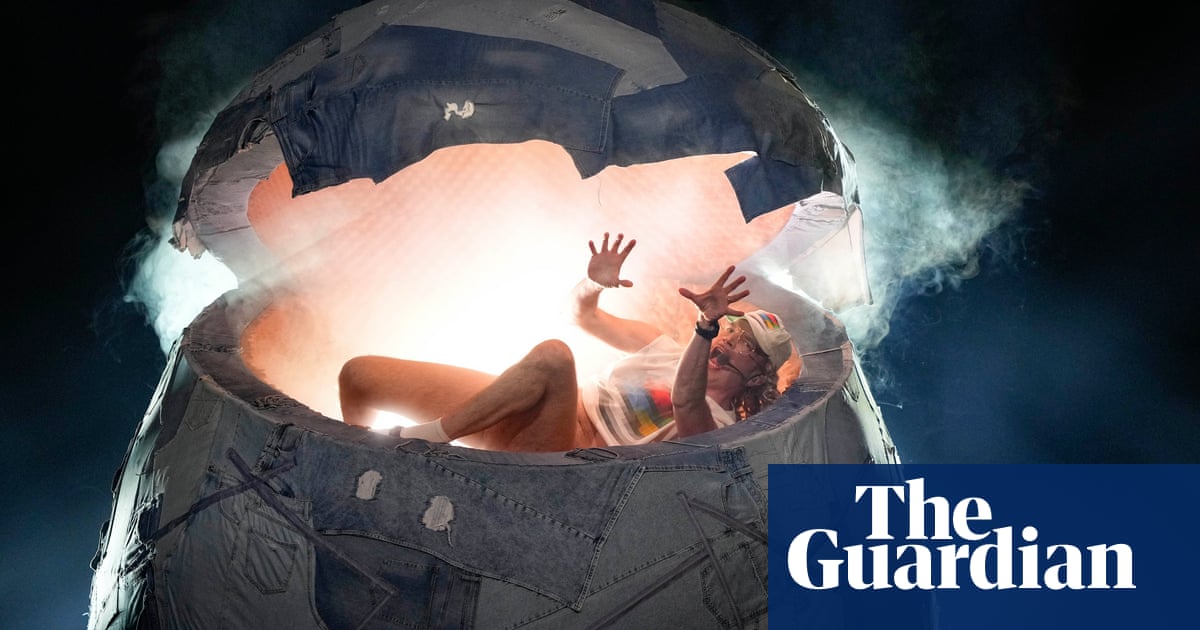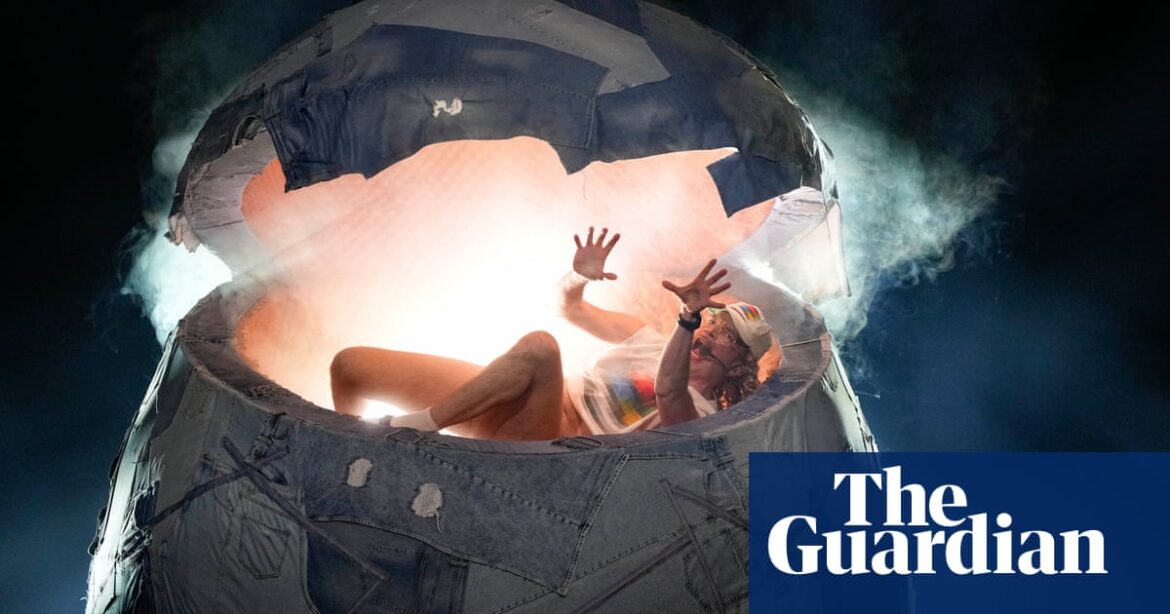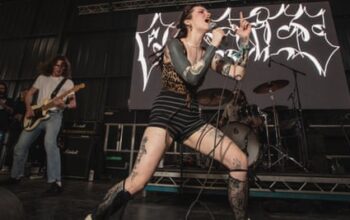
Nemo – The Code (Switzerland)
The bookies’ favourite, and you can see why. For one thing, it addresses a hot-button social issue – the lyrics deal with Nemo Mettler’s non-binary gender identity – that’s also very Eurovision-friendly. In 1998, Eurovision had a transgender winner, Dana International, 34 years before Kim Petras became the first transgender woman to top the UK and US chart with Unholy. More importantly, it’s that rare thing, an original-sounding Eurovision entry that’s charmingly preposterous rather than straight-up daft – its drum’n’bass-influenced rhythm interrupted by high-drama mock-operatics and a vocal that shifts from rapping to falsetto melodrama. You could imagine it in the UK singles chart, which is something one seldom feels with Eurovision songs.
Windows95man – No Rules! (Finland)
Self-conscious wackiness has triumphed at Eurovision before – clearly people thought Netta’s performance of 2018’s winner Toy, complete with chicken noises and much gurning to camera, was endearing, rather than wildly infuriating – so why not the be-mulleted Windows95man, who emerges from what appears to be a giant papier-mache egg, performs in his pants and sings in a voice that sounds like a cross between HP Baxxter of German pop-techno titans Scooter and a heavy metal “death growl”? In fact, he leaves most of the heavy vocal lifting on the pacy No Rules! to someone else, while he gets on with the more important business of waving fireworks around.
Baby Lasagna – Rim Tim Tagi Dim (Croatia)
Don’t be fooled by the fact he’s called Baby Lasagna, his habit of posting TikTok videos dressed as a Balkan answer to Ken from the Barbie movie, or indeed the none-more-Eurovision Boom-Bang-a-Bang-esque title. Rim Tim Tagi Dim deals with the exodus of young Croatians for better opportunities abroad – “I’m going away and I sold my cow!” Its combination of high camp and national pride, synthesisers and hard rock is charming. Moreover, it’s based on a three note riff that, once heard, is basically impossible to dislodge from your brain without recourse to cognitive therapy.
Bambie Thug – Doomsday Blue (Ireland)
Ireland has form with oddball Eurovision winners – Eimear Quinn’s Kate Bush and Enya-inspired The Voice in 1996 – while the success of Lordi and Måneskin proves hard rock sometimes triumphs. Hence wraith-like gothette Bambie Thug’s Doomsday Blue, which is all over the place: feedback-strafed metal one minute, a vocal that recalls Napoleon XIV’s 1966 novelty hit They’re Coming to Take Me Away Ha-Haaa! the next, then pounding industrial noise, followed by plinky-plonk acoustic guitar and Amy Winehouse-ish emoting. It perhaps amounts to Trying A Bit Too Hard, but that’s definitely better than not trying hard enough.
Electric Fields – One Milkali (One Blood) (Australia)
Already stars in their homeland – the members (“two feminine brothers” in their own words) are both refugees from the Australian version of The X Factor – no one can accuse Electric Fields of talking down to their Eurovision audience: partly sung in Indigenous Australian language Yankunytjatjara, One Milkali (One Blood)’s lyrics are based on, wait for it, non-integer positional numeral system the golden ratio base. Perhaps more importantly, it’s a great song, with a classiness that sets it apart from the wilfully tacky end of Eurovision: mid-tempo funk topped off with hands-in-the-air house piano, and soaring anthemic chorus.
Joost Klein – Europapa (Netherlands)
Readers of a certain vintage may dimly remember the 1986 novelty hit Holiday Rap, in which MC Miker G and DJ Sven did their Amsterdam-accented thing over the Madonna hit of the same name: they were, you might recall, going to ring-a-rang-a-dang for a holiday. Something of their spirit seems to rest with Joost Klein, who raps too, albeit in Dutch and German, over that Eurovision staple, a knowing take on warp-speed pop-techno. A lyric about pan-national brotherhood and a touching backstory involving the young Joost promising his now-deceased parents that he would one day represent Holland in Eurovision should boost its chances on the night.
Marina Satti – Zari (Greece)
Starts out sounding – rather unexpectedly – like Laurie Anderson’s O Superman, but soon slips into an appealingly leftfield take on reggaeton, decorated with what sounds like tsampouna, or Greek bagpipes, sundry electronic bleeps and weird vocodered vocals. It’s really good, but possibly too odd to do well. That said, if the official video, which opens with the words “GREECE IS BLISS”, encourages the watching public to visit the land of my forefathers – and it does everything to entice tourists short of coming round their house with a plate of homemade kataifi – then one suspects the Hellenic Eurovision committee will go home happy.
Olly Alexander – Dizzy (UK)
The only British entrant who made a decent Eurovision showing in recent years was Sam Ryder, perhaps because his Bowie-and-Elton-influenced glam ballad Spaceman was different from the usual Eurovision fare. Amazingly, we subsequently reverted to our standard tactic of sending a slightly more pallid version of whatever’s happening in the charts, with inevitable results. Which brings us to the Pet Shop Boys-influenced Dizzy: not a bad song, but not a great one either, and insufficiently sparky to stand out. It’s hard not to feel a bit sorry for Alexander, who seems like a good egg, and piloted enough great pop singles with Years & Years to know Dizzy probably won’t cut it.
Raiven – Veronika (Slovenia)
Ah, the reliable pop hitmaking formula that is a song about the death of a 15th-century Slovenian woman (who was accused of witchcraft after secretly marrying the heir to the throne of Celje) as a metaphor for modern-day feminism. I know, I know: for pity’s sake, not that old chestnut again. But before you consign Veronika to the already-teetering pile of songs involving feminist readings of 15th century witch trials in north-eastern Slovenia, note that, as big, melodramatic, fetch-the-wind-machine-she’s-getting-to the-chorus Eurovision ballads go, Veronika is a pretty classy example, with a gothy undertone, some intriguingly odd chattering voices in its rhythm track and as much impassioned vibrato from Raiven as anyone could wish for.
Megara – 11:11 (San Marino)
San Marino has a chequered history in Eurovision: its entrants have only qualified three times, it twice failed to field a song at all owing to financial difficulties, and it’s never placed higher than 19th. But God loves a trier, and 11:11 – by Spain’s self-styled proponents of “fucksia rock” Megara, who one suspects have noted the way Eurovision catapulted Måneskin to international stardom – is pretty striking. It’s closer to pop-punk than metal (which, given the vogue for pop-punk in the work of Olivia Rodrigo et al, makes it quite timely), with a lot of ridiculous onstage business involving dancing skeletons.
Source: theguardian.com



